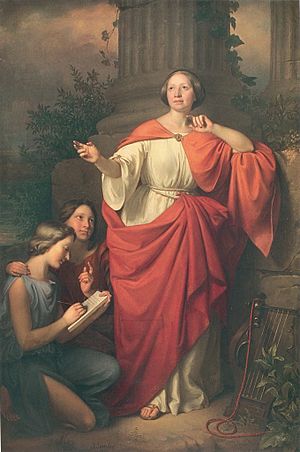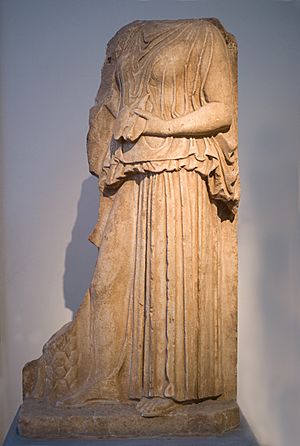Diotima of Mantinea facts for kids
Quick facts for kids
Diotima of Mantinea
|
|
|---|---|

Jadwiga Łuszczewska, who used the pen name Diotima, posing as the ancient seer in a painting by Józef Simmler, 1855
|
|
| Era | Ancient philosophy |
| Region | Western philosophy |
| School | Classical Greek |
|
Notable ideas
|
Platonic love |
Diotima of Mantinea ( Greek: Διοτίμα; Latin: Diotīma) is the name or pseudonym of an ancient Greek character in Plato's dialogue Symposium, possibly an actual historical figure, indicated as having lived circa 440 B.C. Her ideas and doctrine of Eros as reported by the character of Socrates in the dialogue are the origin of the concept today known as Platonic love.
Identity
The name Diotima means one who honors or is honored by Zeus, and her descriptor as "Mantinikê" (Mantinean) seems designed to draw attention to the word "mantis", which suggests an association with prophecy. Explicitly described as a foreigner (ξένη) (201e) and as wise (σοφὴ) in not only the subject of love but also of many other things (ἄλλα πολλά), she is often associated with priestcraft by a majority of scholars insofar as 1) she advises the Athenians on sacrifice (thusiai) which delayed the onset of a plague (201d), and 2) her speech on eros utilizes the language of sacrifice (thusia), prophecy (mantike), purification (katharsis), mystical cultic practices like initiation (teletai) and culminates in revelations/visions (202e). Her descriptor "Mantinikê" (Mantinean) also confirms these associations since the adjective includes the word nikê, "Diotima Mantinikê" a pun in Greek indicating "Diotima prophet of victory". As Evans writes, "Mantinike also contains what sounds like the word for "victory" (nike); as a pun in Greek, Diotima Mantinike thus would sound like "Diotima from Prophet-victory." Socrates provides additional significant information for his fellow symposiasts about Diotima Mantinike that hints at her victorious prophetic powers. He recalls how, at a time in the past when the Athenians were about to be beset by a plague, she was able to delay the plague for ten years by prescribing which civic animal sacrifices (thusiai) the Athenians should perform. Given the Athenians' experiences during the Peloponnesian War, including the devastations of the urban plagues of 429 and 427 BCE and the Spartan defeat of Athens in 404–403, Diotima's name "Prophet-victory" is not without heavy irony for Plato's original audience." (2006, 7) In one manuscript her description was mistranscribed mantikê ('mantic woman' or seeress) rather than Mantinikê, which may be another reason for the reception of Diotima as a "priestess". Other scholars like Martha Nussbaum have noted that Diotima's name stands in direct contrast to Timandra who, according to Plutarch, was Alcibiades' consort. Believing Diotima to be a fiction, Nussbaum argues that "we are moved to ask about her name, and why Plato should have chosen it. The name means "honor the god." Alcibiades had a famous mistress, whose name history records as Timandra. This name means "honor the man." Here, then, Socrates, too, takes a mistress: a priestess, a woman who prefers the intercourse of the pure mind to the pleasures of the body, who honors divine over merely human things." Nussbaum admits though the possibility that Plutarch is using Timandra, herself possibly also a fiction, to purposely juxtapose Socratic eros and common eros.
Since there is no evidence for 'Diotima' outside Plato's Symposium, it has been doubted whether she was a real historical personage rather than a fictional creation. However, many of (though not all, see below regarding 'Callicles') the characters named in Plato's dialogues correspond to real people living in ancient Athens. Plato was thought by some 19th and early 20th century scholars to have based Diotima on Aspasia, the companion of Pericles who famously impressed him by her intelligence and eloquence. This identification was recently revived, with additional suggestions, by Armand D'Angour in Socrates in Love: The Making of a Philosopher. Aspasia herself is a character in Plato's dialogue Menexenus, and it has been argued that Diotima could be an independent historical woman known for her intellectual accomplishments, though she is otherwise unattested.
In the Symposium, Diotima expounds ideas that are different from both Socrates's and Plato's, though with clear connections to both. Socrates also claims to have learned from her on more than one occasion. These indications have been used to argue for Diotima's independent existence; but may account for why Plato does not directly attribute "Diotima's doctrine of Love" to a confirmed historical personage (her doctrine appears Platonic in relation to its introduction of Forms but also unPlatonic in its insistence on generation and reproduction).
A first century bronze relief found in Pompeii depicts Socrates and an unnamed female figure, along with a winged Eros; although some have supposed the seated woman in the image to be Diotima, others have argued her appearance (notably a necklace) would suggest she is in fact more likely to be Aphrodite or Aspasia. Writings from the second through the fifth centuries A.D. refer to Diotima as a real person, although Plato is probably their only basis for this. A second century AD reference to Diotima can be found in the works of Lucian. The suggestion that she was a fictional creation was not introduced until the 15th century by Marsilio Ficino. This hypothesis recalls the practice of using fictional characters in other Platonic dialogues (for instance Callicles in the Gorgias), and draws on the fact that Diotima is not mentioned by any contemporary sources and because her name and origin could be understood as symbolic (see above).
Role in Symposium
In Plato's Symposium the members of a party discuss the meaning of love. Socrates says that in his youth he was taught "the philosophy of love" by Diotima, who was a seer or priestess. Socrates also claims that Diotima successfully postponed the Plague of Athens. In a dialogue that Socrates recounts at the symposium, Diotima says that Socrates has confused the idea of love with the idea of the beloved. Love, she says, is neither fully beautiful nor good, as the earlier speakers in the dialogue had argued. Diotima gives Socrates a genealogy of Love (Eros), stating that he is the son of "resource (poros) and poverty (penia)". In her view, love drives the individual to seek beauty, first earthly beauty, or beautiful bodies. Then as a lover grows in wisdom, the beauty that is sought is spiritual, or beautiful souls. For Diotima, the most correct use of love of other human beings is to direct one's mind to love of wisdom, or philosophy. The beautiful beloved inspires the mind and the soul and directs one's attention to spiritual things. One proceeds from recognition of another's beauty, to appreciation of Beauty apart from any individual, to consideration of Divinity, the source of Beauty, to love of Divinity.
. . . and directing his gaze from now, on towards beauty as a whole, he should turn to the great ocean of beauty, and in contemplation of it give birth to many beautiful and magnificent speeches and thoughts in the abundance of philosophy. (Diotima to Socrates in Plato's Symposium.)
See also
 In Spanish: Diotima para niños
In Spanish: Diotima para niños


